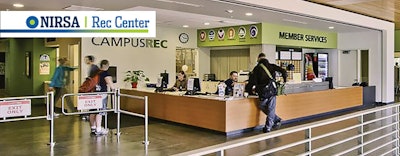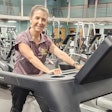
Campus recreation has come a long way since the days when women weren't recognized as NIRSA members — true story! — but the need for progress never stops. For example, some segments within student populations may still feel like they don't belong at rec centers.
"Patrons in larger bodies didn't necessarily have a specific experience that made them feel unwelcome, but there are a lot of assumptions about what you should look like if you go to a gym," says Erin Bransford, fitness and wellbeing coordinator at Portland State University. "We've received comments such as, 'I would never go there' and 'There's nothing they could do that would make me feel like it was someplace I belong.' It can be an uphill battle for rec centers, because there's a strong preconceived notion a lot of people have about gyms and gym culture."
Which is why Bransford set out to ensure that the culture at the Portland State University Rec Center does not reinforce those preconceived notions. During the summer of 2020, she offered an optional virtual training session for campus recreation staff based on the principles of Health at Every Size — a compassionate approach to public health that de-emphasizes weight loss as a health goal and focuses on supporting people of all sizes in finding ways to take care of themselves. By the fall, HAES training became mandatory within the department.
"This is a huge paradigm shift from what a lot of people have been taught their entire life, especially if they grew up in the United States," says Bransford, who spoke on the topic at the 2021 NIRSA Virtual Conference & Campus Rec and Wellness Expo, presented by PLAE. "I think it's important for PSU Rec Center staff to challenge assumptions that people with larger bodies don't eat right or don't exercise or don't have the willpower to take care of themselves. In most cases, this simply is not true."
Research shows that there are many factors outside of an individual's control that can relate to their body size — such as family history and the environment in which they live.
Of critical importance, she adds, is de-emphasizing to all students the role a campus recreation center plays in personal appearance and underscoring other benefits instead: more energy, an increased focus in the classroom or even a new sense of community.
In promotional materials, Bransford suggests replacing language that reinforces stereotypes ("Get fit!") with more universally positive ones ("Meet your new best friend!" or "Need an energy boost before that big exam?").
"Our marketing team has fully bought into this idea. They double-check all the language before something goes out to make sure that it's not reinforcing diet culture, gym culture or looking a certain way," Bransford says, noting that an outside department not affiliated with campus recreation recently changed promotional copy her department wrote about a group exercise class for a newsletter distributed to all faculty and staff. "We submitted a headline about 'joyful movement' — really being intentional with our words and following HAES principles — and it got changed to something like 'get fit with Campus Rec.' That's the message that went out to the entire university about our group fitness classes. So even if you're trying hard within your own department, people already have their beliefs about what the rec center is. That incident made us realize that changing the culture is really hard."
Including staff members
Cara Lucia has made changing the culture a prime mission of her work as both chair of the Department of Sport Management at Elon University and the new president of NIRSA. She's found that a welcoming culture in campus recreation is critical not only for students, but also for staff and faculty.
"We need to identify inequitable spaces in our organizations that create environments where individuals may not feel — or are not — included by exploring intersections of identity, evaluating department culture and creating intentional mentor-mentee relationships," Lucia says. "We can't continue to ignore the vestiges of prejudice or barriers that still exist."
Lucia and Mila Padgett, director of Campus Recreation and Wellness at the University of South Carolina Aiken, are currently chronicling the experiences of women and their professional trajectory in campus recreation for publication in NIRSA's Recreational Sports Journal later this year. They interviewed 36 women in the field between the ages of 25 and 65 to learn more about their professional work experience, the stereotypes and biases they face, and their conflicts with balancing work and life. In addition, Lucia and Padgett provide actionable items for associations and campus departments to positively change organizational culture.
They presented a session based on their findings titled "Passage Through the Leadership Labyrinth: A Women's Journey in the Collegiate Recreation Profession" as part of NIRSA's 2020 Summer of Learning series.
This work arrives at a critical time, as 2021 marks the 50th anniversary of the year women were reinstated in the National Intramural Association (NIRSA's original name). The organization was founded in 1950 by 20 male and female intramural directors from 11 Historically Black Colleges and Universities. Leadership in 1959 made the decision to ban women from the membership ranks, and they remained on the outside until 1971 — one year before the passage of Title IX of the Education Amendments of 1972. Lucia notes that of NIRSA's 71 presidents, 14 have identified as women (the first in 1987), and only eight Black individuals (seven males and one female) have served in the role.
"These disparities make it apparent that more work needs to be done regarding the history of marginalized groups and the systems needing change," Lucia says. "The hope is that we will be able to guide and support women as they enter the field and throughout their career. Creating implicit bias literacy programs for staff to address organizational culture and providing women with concrete feedback about why they are selected to serve in a specific role is critical. We also need to think about how we're being supportive and welcoming of colleagues, with the goal of creating a culture where people feel included and can show up at work as their authentic self."
A cultural reset
How campus recreation departments attain that kind of culture will vary, but Lucia offers a universal starting point.
"The key is creating brave spaces where people can assess their current organization's culture, their current challenges, and think of specific actions that can be taken to make improvements," she says, likening the ways in which some campus recreation professionals and some student populations may not feel entirely welcome in facilities designed to engage everyone. "As a woman, there are different things I've experienced throughout my life that can impact how I'm engaged as a professional, just as a young person is treated a certain way based on weight or perceived appearance."
Bransford believes the disruption brought about by the coronavirus pandemic can encourage a major cultural reset for departments.
"It's a really great time to re-evaluate what you've been doing, why you've been doing it, what you are bringing back — and why," Bransford says. "Our marketing and programming are so different now, and we're having to re-do things anyway. We have this opportunity to weave in new philosophies or principles. But this is not something that after one training, everything is going to be all better and the whole culture is going to change. It really is going to be baby steps, and it will be an ongoing process."
This article originally appeared in the July|August 2021 issue of Athletic Business with the title "How to create a campus rec environment for everyone ." Athletic Business is a free magazine for professionals in the athletic, fitness and recreation industry. Click here to subscribe.





































